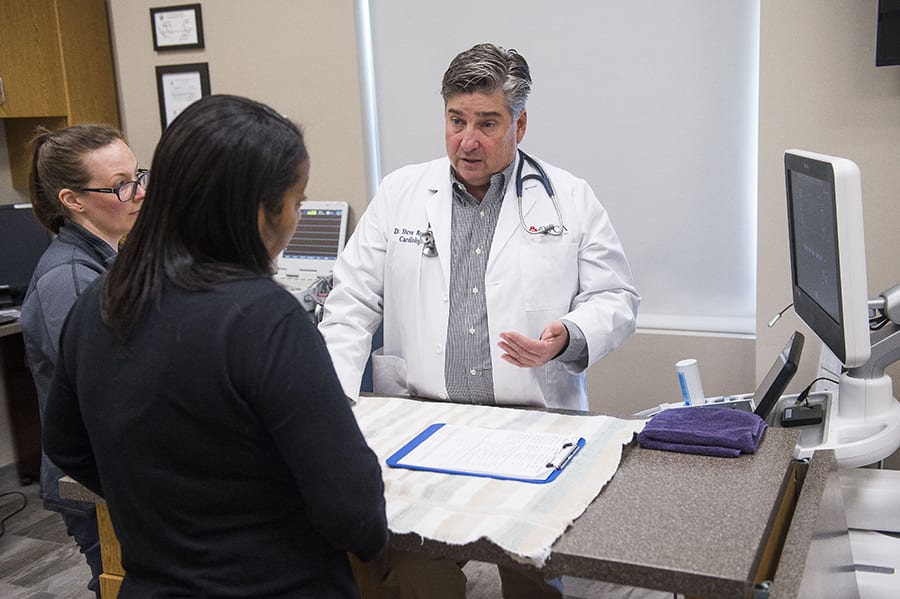How a Cancer Veterinary Near Me Can Improve Your Pet’s Quality of Life}
Exploring the Necessary Services Provided by a Veterinary Cardiologist: Recognizing Ultrasound and CT Scan Techniques
Vet cardiologists play a vital role in the health and wellness of pets by diagnosing and dealing with numerous heart disease. They utilize sophisticated imaging methods, such as heart ultrasound and CT scans, to give accurate assessments. Each technique has its distinctive advantages and applications. Comprehending these strategies is crucial for animal owners seeking the most effective take care of their friends. What variables should animal owners think about when selecting in between these analysis devices?

The Role of Veterinary Cardiologists in Pet Dog Health Care
Veterinary cardiologists play a vital function in the healthcare of animals, concentrating especially on diagnosing and treating heart-related conditions. They possess specialized training that permits them to analyze complex diagnostic tests and determine different cardio concerns. These professionals utilize advanced methods, such as echocardiography and electrocardiography, to examine heart feature and framework accurately.Veterinary cardiologists additionally create customized treatment plans that may include drugs, way of living alterations, and, in some instances, medical interventions. Their experience reaches enlightening pet dog proprietors regarding heart health and wellness, emphasizing the importance of regular exams and very early discovery of prospective issues. Collaboration with general vets is essential, as it ensures complete care for animals with suspected heart problems. By providing specialized services, vet cardiologists considerably improve the quality of life for pets and provide satisfaction for their owners, enhancing the value of heart health and wellness in overall animal wellness.
Usual Heart Problems in Pets
Usual cardiac issues in family pets can considerably impact their wellness and high quality of life. Heart whisperings, different kinds of cardiomyopathy, and genetic heart flaws are among one of the most prevalent problems that veterinarians run into. Board Certified Veterinary Cardiologist. Recognizing these problems is important for pet proprietors to guarantee prompt diagnosis and proper treatment
Heart Murmurs in Pets
Heart murmurs can be a resource of concern for family pet proprietors, they are not always a sign of serious health and wellness concerns. A heart whispering is an unusual noise generated by rough blood flow within the heart. In pet dogs, these murmurs can be triggered by numerous factors, including genetic heart flaws, shutoff issues, and even anxiety during evaluations. Several pets with heart whisperings lead normal lives without substantial health and wellness effects. To establish the underlying reason, vet cardiologists usually use analysis strategies such as echocardiograms and Doppler ultrasounds. Early discovery and evaluation are crucial, as they might aid manage any prospective heart concerns properly. Pet dog proprietors are urged to consult their vet for a thorough evaluation if a heart murmur is detected.
Cardiomyopathy Types Explained
Cardiomyopathy incorporates a team of illness impacting the heart muscle mass, resulting in compromised heart feature in animals. The most common kinds consist of expanded cardiomyopathy (DCM), hypertrophic cardiomyopathy (HCM), and restrictive cardiomyopathy (RCM) DCM primarily influences pets, triggering the heart to deteriorate and expand, which diminishes its capacity to pump blood properly. On the other hand, HCM is much more prevalent in pet cats, defined by the thickening of the heart wall surfaces, typically resulting in blocked blood circulation. RCM, though less usual, happens when the heart muscle comes to be stiff, limiting its capacity to fill up with blood. Each type offers special challenges in medical diagnosis and treatment, necessitating specialized vet cardiological assessment to assure peak administration and care for impacted family pets.
Congenital Heart Issues
Hereditary heart defects represent a substantial classification of heart problems in pets, unique from gotten conditions such as cardiomyopathy - Ultrasound For Dogs. These defects are structural problems present at birth, influencing the heart's normal feature. Common kinds include license ductus arteriosus, ventricular septal problems, and pulmonic constriction. Symptoms might differ widely, varying from mild to serious, and can include workout intolerance, coughing, and trouble breathing. Early diagnosis through sophisticated imaging strategies like ultrasound is vital for reliable management. Vet cardiologists play a vital duty in identifying these problems and advising appropriate treatment choices, which might include medical administration or surgical intervention. Acknowledging genetic heart issues enables better outcomes and boosted lifestyle for affected animals
Comprehending Cardiac Ultrasound: Exactly How It Functions
A substantial variety of vet techniques currently make use of heart ultrasound look at this now as an essential diagnostic device for examining heart health and wellness in animals. This non-invasive method utilizes high-frequency acoustic waves to produce photos of the heart's framework and feature. Throughout the treatment, a vet service technician uses a gel to the animal's breast and utilizes a transducer to discharge ultrasound waves. These waves jump off the heart and surrounding structures, generating real-time images on a monitor.Veterinarians can assess numerous facets of heart health and wellness, including chamber size, wall motion, and shutoff feature. Furthermore, cardiac ultrasound permits the discovery of problems such as liquid build-up and hereditary heart problems. This technique is vital for diagnosing problems that might not show up with conventional radiographs. By offering detailed details regarding the heart's composition and performance, heart ultrasound aids in formulating reliable therapy prepare for pets dealing with heart illness.
The Importance of CT Scans in Detecting Heart Issues
Just how do CT scans improve the diagnosis of heart disease in vet medicine? CT scans provide comprehensive cross-sectional photos of the heart and bordering structures, permitting veterinarians to imagine complex physiological connections. This imaging technique is specifically helpful in determining congenital heart flaws, cardiac growths, and abnormalities in blood vessels. By making use of sophisticated imaging formulas, CT scans can analyze heart chamber sizes and feature, providing an extensive sight that may be tough to achieve with typical methods.Additionally, CT angiography can imagine blood circulation and identify areas of constriction or obstruction, which is essential for preparing potential treatments. The speed and accuracy of CT scans also promote quick medical diagnoses, vital in emergency situations. Ultimately, the unification of CT checks right into vet cardiology significantly enhances the accuracy of diagnoses, allowing targeted therapy strategies and improving client results for pets experiencing from heart disease.
Contrasting Ultrasound and CT Scan Strategies
While both ultrasound and CT scans are important tools in veterinary cardiology, they use unique advantages and restrictions that affect their use in diagnosing heart disease. Ultrasound, or echocardiography, offers real-time imaging of the heart's structure and function, enabling veterinarians to examine heart chambers, valves, and blood flow. It is particularly effective for assessing conditions like coronary infarction and cardiomyopathy. Nevertheless, ultrasound may be limited in imagining specific anatomical frameworks due to patient size or obesity.In contrast, CT checks deal comprehensive cross-sectional pictures home of the heart and surrounding tissues, making them ideal for recognizing structural problems, lumps, or vascular problems. Although CT scans provide detailed understandings, they require sedation and might include radiation exposure. Eventually, the option in between ultrasound and CT scans depends on the details scientific scenario, the individual's condition, and the details needed for an accurate diagnosis.
Treatment Choices Available Via Veterinary Cardiology
Vet cardiology offers a series of treatment alternatives tailored to resolve different heart disease in animals. Therapy plans usually start with lifestyle adjustments, including diet regimen modifications and workout modifications, targeted at enhancing total heart health and wellness. Medications play an essential function, with cardiologists prescribing medicines such as diuretics, beta-blockers, and ACE inhibitors to take care of signs and boost heart function.In extra serious instances, interventional procedures, such as balloon valvuloplasty or stent placement, may be needed to relieve blockages or boost blood flow. For sure genetic heart problems, surgical alternatives may be discovered to deal with architectural problems. In addition, recurring monitoring and follow-up care are crucial components of a complete therapy strategy, enabling timely adjustments based on the family pet's action to treatment. Overall, veterinary cardiology focuses on supplying efficient, customized like optimize the health and well-being of animal patients with heart disease.
How to Prepare Your Animal for a Cardiac Examination
Preparing a family pet for a heart examination is necessary to assure exact outcomes and a smooth procedure. Proprietors must initially arrange the consultation with the vet cardiologist and review any kind of details Home Page requirements or concerns. It is advisable to hold back food for at the very least 12 hours before the examination, as this aids boost imaging top quality throughout procedures like ultrasound or CT scans.Additionally, maintaining a tranquil setting on the day of the consultation can help in reducing the family pet's anxiousness. It is valuable to bring along any relevant medical records, including previous examinations and medicines (Board Certified Veterinary Cardiologist). Proprietors must likewise make certain that their pet fits and leashed throughout transport to the facility. Acquainting themselves with the evaluation procedure can reduce fears and help in asking educated concerns throughout the assessment. By following these actions, owners can contribute greatly to the performance of the cardiac assessment
Frequently Asked Inquiries
Exactly how Long Does a Heart Ultrasound or CT Scan Take?
The period of a cardiac ultrasound normally ranges from 30 to 60 mins, while a CT check may take about 15 to thirty minutes. Aspects such as the individual's condition can influence these time quotes.

Exist Any Risks Linked With These Diagnostic Procedures?

Can I Remain With My Animal During the Treatment?
The vet facility's policy generally determines whether pet dog proprietors can remain throughout treatments. While some centers encourage proprietor existence for comfort, others might need separation to assure safety and security and suitable conditions for diagnostic imaging.
Just how much Do These Diagnostic Tests Commonly Price?
The expenses of diagnostic examinations, such as ultrasound and CT scans, normally vary based upon location and center. Usually, prices vary from a few hundred to over a thousand bucks, showing the complexity and modern technology included.
What Is the Recuperation Process After a Cardiac Examination?
The healing process after a heart assessment involves keeping an eye on the animal for any kind of instant responses, making sure comfort, and restricting physical activity. Vets usually provide post-evaluation directions to guide pet dog owners throughout this vital recuperation period. Heart whisperings, various kinds of cardiomyopathy, and genetic heart problems are amongst the most widespread conditions that vets experience. A heart whispering is an uncommon sound created by stormy blood flow within the heart. Cardiomyopathy incorporates a group of illness affecting the heart muscle mass, leading to endangered cardiac feature in pets. Hereditary heart issues represent a considerable category of cardiac problems in family pets, distinct from obtained problems such as cardiomyopathy. Ultrasound, or echocardiography, provides real-time imaging of the heart's framework and feature, allowing vets to evaluate heart chambers, shutoffs, and blood circulation.